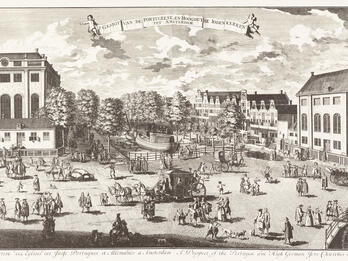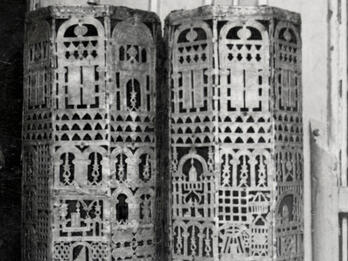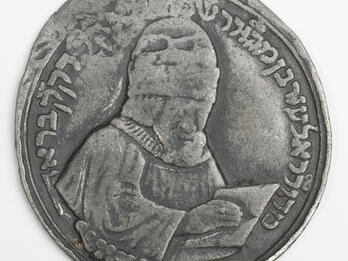Poem on the Pestilence of 1713
In the year 5473 [1713] since the creation of, the world, from the moment it began the plague fell upon us because of our many sins. In the community we still had no one ill nor bad air in the country.
Unfortunately, a great change came about on 22 Tammuz. How did things deteriorate until evil gripped the holy community, and we grew anguished? Six people in one house fell ill at the same time.
And the plague struck hard: after three days, three were already dead; others were beginning death struggle, and in two days they, too, died.
In the community, as soon as anyone caught it, a terrible fear gripped us. Everyone wanted to flee, to escape.
Many people went to the authorities, who took them under their protection in the countryside. And here they were seen everywhere packing and departing, from every street and every corner [of the city]. All day long they were seen carrying cases, and what are they to do, the poor who remember seeing all the rich people leaving to save their own skin? We, we are compelled to stay behind in misfortune!
This evacuation occasioned a great, heartbreaking turmoil in the community. And a great fear seized the people. All the porters and coachmen around were inadequate to the need.
Thousands of people thus made arrangements [to depart]. So effectively that no more rich people remained in the community, nor scholars or other people of means: everyone had departed.
You who pass along the roads, see what has happened to us and may you be spared! The president of the rabbinic court and the leader of our community have left, and we have seen them. The beauty and light of so many years, we have seen depart. Who will protect us now? [ . . . ]
Our sins took precedence over everything; and we measure how terrible is God’s anger that fell upon us. How the poor have been harshly struck! On 22 Menaḥem1 all our streets were closed because of the extent of our sins.
Many people fled, if [however] they had not been seized here by the ravages [of the epidemic]. For several days the roads were full; but it was no longer possible to find refuge.
Heaven took the Just from among us, the great preacher and rector of the yeshivah. God took them all from us! How misfortune fell upon us because of our sins! May Heaven forbid it: that such a just man should meet such misfortune!
I would still like to tell how this calamity came to pass, even until this day. And how so many people died of the plague because of our sins. At first it was thought that this fire could be put out, but it grew into an epidemic.
So the leader made a rule: when someone was suspected of being in danger, he had to be taken out of his house and laid in a hut.
All others from the same house who were still healthy and feeling well might stay at home, it was suggested. And this is how the world began to turn upside down.
Most of the babies died. As the plague began to tear a great number of infants from their mothers’ bellies, because of all our sins, they perished. And the plague immediately hounded our children [to the tomb].
During the day, mothers and infants died. It often [happened] that the father and the other children died as well. Three of the dead were carried on a single stretcher. This was seen in every street and on every corner. [ . . . ]
More than eighty, ninety, even one hundred eighteen persons died in a single day. How did they drag themselves along, diseased and destroyed? Certain people thought they could stay in the homes of others, but the bitter death they harbored in their own homes caused the others to chase them away. [ . . . ]
There were eight hundred sick, and sometimes this number rose to a thousand at once. How could the nurses, the barbers, and the provisions suffice? All the huts and the bathhouse as well were overflowing, for it was here that the poor were lodged.
I must continue and begin by [saying] what was done about the burial of the dead. To our misfortune, an order was given by the [royal] authorities which we had to follow scrupulously.
When someone would die, he could not be buried in the nearest cemetery but had to be driven or carried to the lazar house. Who could have looked upon such misery and such unhappiness! The Kahal ordered three large wagons.
Each wagon would carry about twenty [bodies], and every night they passed three times in front of the door. There the dead lay many days, until two weeks were up, and then one could no longer drive them there by cart. [ . . . ]
In every street and in every corner you saw nothing but people dragging wood to carry [the dead]. Who would not have wept and wailed to witness such carnage? [To look upon] this destruction that befell us? [ . . . ]
We also had to dig [graves] day and night, on the sabbath and on holidays, as well as transport the dead by wagon. The number of dead multiplied so that nothing frightens me but the telling of it.
Up to one hundred people were busy sawing planks day and night. All those who could work came to help. Several hundred women were busy sewing shrouds. How the eye rebels at this sight!
No more planks were found for the coffins, so those who had cupboards and chairs were asked to contribute them for mortuary purposes, and [were told] that the Kahal would pay for this. [ . . . ]
There were several hundred people digging [graves] at the lazar house, and more were needed. With good words the people of the Kahal implored the poor to come work as well: [ . . . ]
Most of the dead were no longer recognizable. Those who could be given a name were rare, usually those on whom a paper was found. Any corpse that was whole was given a proper burial.
Let us cry out to God, my good friends, and with all our heart, that He may preserve us in the future from such sorrows! I write all this so that you shall remember, and will no longer desire to sin.
Notes
Words in brackets appear in the original translation.
[Another name for the Hebrew month of Av.—Ed.]
Credits
Published in: The Posen Library of Jewish Culture and Civilization, vol. 5.





